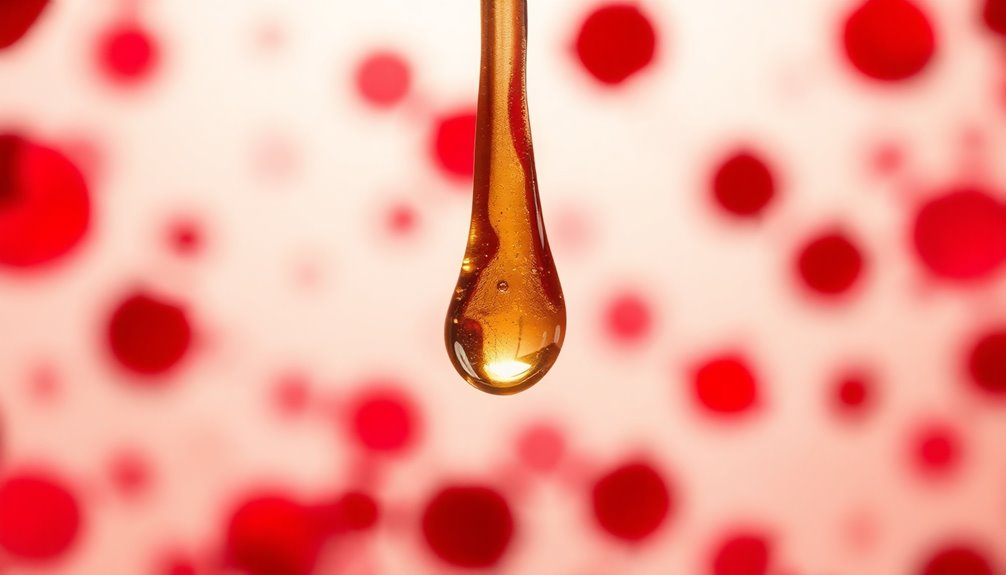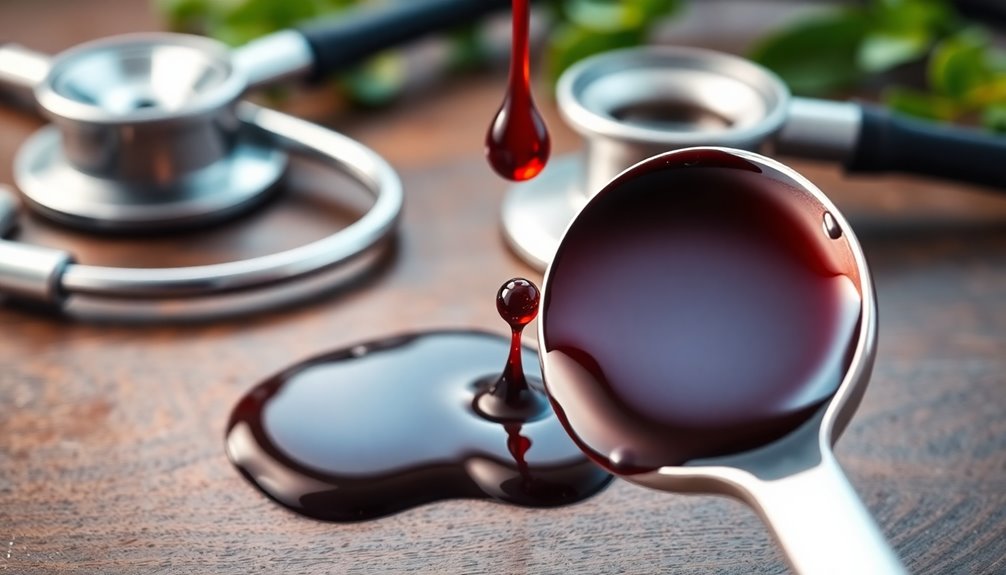Vinegar, especially apple cider vinegar, can mildly thin your blood thanks to its acetic acid. It inhibits platelet aggregation and promotes the breakdown of fibrin clots, which can help prevent thrombus formation. However, its effects are not as strong as other natural blood thinners like garlic or turmeric. While vinegar may benefit circulation and overall health, it isn't enough to dissolve existing clots. You should use it with caution, especially if you're on blood thinners or have low potassium. Curious about how vinegar stacks up against other options? There's more insight waiting for you.
Key Takeaways
- Vinegar, particularly its active ingredient acetic acid, inhibits platelet aggregation, potentially reducing blood clotting.
- Acetic acid promotes the breakdown of fibrin clots, helping prevent thrombus formation.
- The anticoagulant effects of vinegar are mild compared to other natural blood thinners like garlic and turmeric.
- Long-term vinegar consumption may affect potassium levels and interact with certain medications; caution is advised.
- Consultation with a healthcare professional is recommended before incorporating vinegar into a health regimen.
Mechanism of Action

When you consume vinegar, its active ingredient, acetic acid, plays a crucial role in various physiological processes that can influence blood thinning.
Acetic acid inhibits platelet aggregation, especially when triggered by substances like adenosine diphosphate and thrombin. For instance, at a concentration of 2.00 mM, it reduces platelet aggregation induced by arachidonic acid to about 36.82%.
Additionally, acetic acid activates plasminogen, leading to the breakdown of fibrin clots, which helps prevent thrombus formation. It also inhibits cyclooxygenase-1, lowering thromboxane-A2 levels, a key player in platelet aggregation. This aligns with the findings that vinegar contains bioactive constituents that can further enhance its health benefits.
Thus, vinegar's components work together to enhance circulation and potentially contribute to healthier blood dynamics.
Effects on Blood Clotting

While vinegar is often lauded for its health benefits, its effects on blood clotting deserve careful consideration. Acetic acid, the main component, inhibits platelet aggregation triggered by substances like ADP and collagen. This inhibition can reduce arachidonic acid-induced platelet aggregation to about 30.25%.
Additionally, acetic acid activates plasminogen, promoting the breakdown of fibrin, which is essential for clot formation. However, vinegar's anticoagulant properties aren't strong enough to dissolve existing clots. It is important to note that vinegar does not substitute for natural blood thinners and should be used with caution.
If you're using natural blood thinners like ginger or turmeric, be cautious, as they may interact negatively with vinegar. Long-term vinegar consumption can also affect potassium levels and potentially interfere with medications.
Always consult a healthcare professional before combining vinegar with other blood-thinning agents.
Clinical Evidence

How effective is vinegar in promoting blood thinning? Research indicates that acetic acid, the main component in vinegar, inhibits platelet aggregation and shows fibrinolytic activity, suggesting it could help prevent cardiovascular diseases. While clinical trials reveal modest benefits in lowering blood glucose and cholesterol, the direct link between vinegar consumption and blood thinning remains limited. Studies show that daily consumption of apple cider vinegar may also contribute to reducing fasting blood glucose levels, further supporting its potential health benefits.
Animal studies support potential health benefits, including cancer prevention and antioxidant effects, but these don't directly correlate to blood thinning. Compared to other natural substances like garlic or turmeric, vinegar's anticoagulant effects are mild.
Safety and Dosage

Although many people turn to apple cider vinegar (ACV) for its potential health benefits, it's crucial to understand its safety and proper dosage.
ACV isn't specifically known for blood-thinning effects, but its high acidity can cause digestive issues, including nausea and throat irritation. Always dilute ACV with water to minimize these risks. Additionally, acetic acid in ACV has potential health properties, which may contribute to its various benefits.
The recommended daily intake is much lower than what's often consumed in case studies, so moderation is key. If you have health conditions like low potassium, it's best to limit or avoid ACV altogether.
Consult your healthcare professional before adding ACV to your routine, especially if you're on medications or have underlying health issues.
Comparison to Other Blood Thinners

Apple cider vinegar may have some antiplatelet properties, but it's important to consider how it stacks up against other natural blood thinners.
Garlic, for instance, contains allicin that effectively inhibits platelet aggregation and enhances endothelial function. Nattokinase breaks down fibrin, helping dissolve existing clots, while turmeric's curcumin inhibits clotting enzymes, though it's poorly absorbed. Additionally, natural blood thinners like ginger and omega-3 fatty acids provide significant support for cardiovascular health. Understanding the effects of these alternatives is crucial, especially considering their roles in preventing cardiovascular issues.
Cod liver oil, rich in omega-3 fatty acids, promotes red blood cell flexibility and reduces viscosity. Pine bark extract, or Pycnogenol, demonstrates a stronger effect on clot formation than aspirin.
Although vinegar shows promise in preventing cardiovascular issues, other natural alternatives might offer more potent and targeted benefits. Always consult with a healthcare provider before relying on any natural remedy for blood thinning.
Frequently Asked Questions
Can Vinegar Replace Prescribed Blood Thinners?
Vinegar can't replace prescribed blood thinners.
While it may offer some mild anticoagulant effects, it doesn’t match the efficacy of medications like aspirin or anticoagulants, which are crucial for serious conditions. Additionally, the anticoagulant effects of coffee are not consistent and can vary greatly depending on the individual and their consumption habits. It’s important to note that relying on coffee as a substitute for prescribed anticoagulant medications could pose serious health risks. Just as the americano and latte differences can greatly impact the flavor and strength of the coffee, the difference between natural substances like coffee and pharmaceutical-grade anticoagulants is significant and should not be overlooked. It’s always best to consult with a healthcare professional before making any changes to your medication regimen.
You should consider vinegar as a complementary option, not a substitute.
Always consult a healthcare professional before making any changes to your treatment plan, especially if you have blood clotting disorders.
Prioritize safety and well-informed decisions regarding your health.
How Does Vinegar Interact With Other Supplements?
When considering how vinegar interacts with other supplements, you need to be cautious. It can lower potassium levels, especially when combined with diuretics or other potassium-lowering supplements, increasing the risk of severe hypokalemia.
If you're taking vitamin E, garlic, or turmeric, you should also monitor your intake, as these can enhance vinegar's anticoagulant effects.
Always consult with a healthcare provider before mixing vinegar with supplements to ensure your safety and health. Additionally, it’s important to be aware of how various substances can interact with each other. For example, if you’re considering drinking vinegar alongside other beverages or supplements, reviewing the coke zero ingredient breakdown can help you understand how those ingredients may affect your body. Always prioritize your health by seeking professional advice tailored to your individual needs.
What Are the Best Types of Vinegar for Blood Thinning?
When considering the best types of vinegar for potential blood thinning, apple cider vinegar stands out due to its acetic acid content and mild anticoagulant properties.
Distilled white vinegar also has a high acetic acid concentration, but it lacks nutritional benefits.
While balsamic and rice vinegars contain acetic acid, they may be less effective.
Keep in mind, moderating your intake and consulting a healthcare provider is essential before making any changes to your regimen.
Can Vinegar Consumption Affect Blood Pressure?
Yes, vinegar consumption can affect blood pressure.
If you incorporate vinegar into your diet, you might notice a reduction in both systolic and diastolic blood pressure. Studies suggest that even small increments, like 30 ml per day, can lead to significant decreases.
The acetic acid in vinegar plays a key role in this process by reducing renin activity and improving circulation.
Just remember to consult your healthcare provider before making any significant changes to your diet.
Is Vinegar Safe for Pregnant or Breastfeeding Women?
When considering vinegar during pregnancy or breastfeeding, safety's key. Stick to pasteurized apple cider vinegar to avoid harmful bacteria.
It might help with heartburn or bloating, but moderation's important. Always consult your doctor before adding it to your diet.
While there's limited research on its effects during breastfeeding, be cautious of potential interactions with medications.
Monitor for any side effects, and ensure it's part of a balanced diet to support your health.
Conclusion
In conclusion, while vinegar may have some effects on blood clotting due to its acetic acid content, it's not a substitute for prescribed blood thinners. If you're considering using vinegar for its potential health benefits, it's crucial to consult with a healthcare professional first. They can guide you on safe usage and ensure it won't interfere with any medications. Always prioritize your health and make informed decisions when it comes to your blood health.









